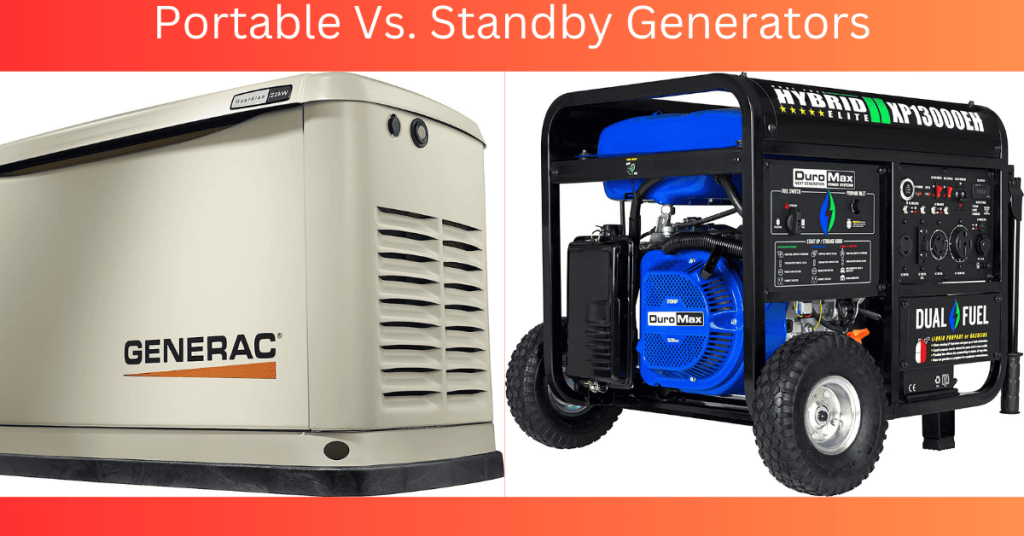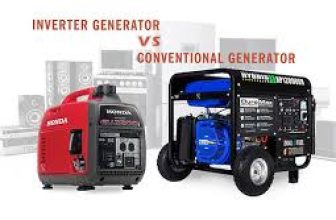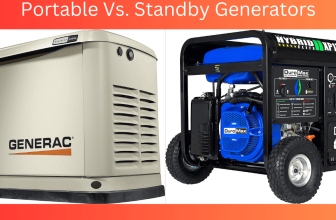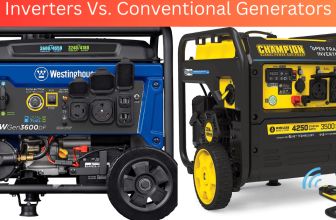Generators are like superheroes, ready to swoop in and save the day when the power goes out. But just like superheroes, they come in different shapes and sizes, each with their own unique set of powers.
In this article, we’ll demystify generators and take a closer look at two of the most popular types: standby and portable.
As someone who craves mastery, you know that understanding the differences between standby and portable generators is essential when it comes to choosing the right one for your needs. Whether you’re preparing for a natural disaster or just want to be prepared for the occasional power outage, having the right generator can make all the difference.
So let’s dive in and explore the world of generators together!
Key Takeaways
- Generators come in two types: standby and portable.
- Standby generators are permanent installations connected to the main power supply and are more expensive but offer greater convenience and reliability.
- Portable generators are smaller and more affordable, designed for versatility, but are not meant to be the primary power source for homes or businesses.
- Regular maintenance is necessary for efficient functioning and neglecting maintenance can decrease lifespan by up to 50%.

Overview of Generators
An overview of generators is provided, highlighting their key features and functions. Generators are devices that convert mechanical energy into electrical energy. They’re an essential backup power source for homes, businesses, and industries in case of power outages.
Generators come in two types: standby and portable. Standby generators are permanent installations that are connected to the main power supply of a building or home. They automatically turn on when there’s a power outage, ensuring that electricity is available at all times. Standby generators are ideal for large homes or businesses that require a continuous power supply. They can run on natural gas, propane, or diesel fuel.
Portable generators, on the other hand, are small and can be moved from one location to another. They’re ideal for camping trips, construction sites, and outdoor events. Portable generators are powered by gasoline and have a limited capacity. They’re not meant to be used as a primary power source for homes or businesses.
Now, let’s take a closer look at standby generators and their functions.
Standby Generators
You might be surprised to know that standby generators are designed to automatically turn on during a power outage, providing uninterrupted power to your home or business. These generators are permanently installed and connected to your electrical system, making them a reliable source of backup power. They are typically powered by natural gas or propane, which means they can run for days or even weeks without needing refueling.
Standby generators come in various sizes and power capacities, depending on the needs of your home or business. To determine the right size for your needs, it’s important to calculate the total wattage of all the appliances and devices you need to power during an outage. This can be done by using a simple chart that lists the wattage of common household appliances and electronics.
Here’s an example of a wattage chart for common household appliances and electronics:
| Appliance/Electronic | Watts |
|---|---|
| Refrigerator | 600-800 |
| Freezer | 500-700 |
| Microwave | 1,000-1,500 |
| TV | 100-400 |
| Computer | 150-300 |
Now that you know about standby generators, let’s take a look at portable generators and their benefits.
Portable Generators
So, let’s talk about portable generators. These babies are designed for versatility, meaning they can be used in a variety of settings and situations. They’re also easy to move around, making them a great option for those who need power on the go or in remote locations.
However, it’s important to note that portable generators are typically less powerful than their standby counterparts.
Designed for Versatility
When it comes to generators, there’s nothing quite like the versatility of a standby or portable model. Portable generators, in particular, are designed to be incredibly versatile, allowing you to power everything from your home during a power outage to your camping trip in the wilderness.
Here are some ways in which portable generators are designed for versatility:
- Size: Portable generators come in a variety of sizes, from small and lightweight to larger models that can power an entire home. This makes them perfect for a wide range of applications, from powering a few appliances during a power outage to providing electricity for a construction site.
- Fuel options: Many portable generators can run on a variety of fuel types, including gasoline, propane, and diesel. This allows you to choose the fuel type that is most convenient for you, whether you’re at home or on the go.
With their versatility, it’s no wonder that portable generators are becoming increasingly popular. And with their easy-to-move-around design, they’re also incredibly convenient for those who need power on the go.
Easy to Move Around
Imagine effortlessly transporting a generator to your next outdoor adventure, without feeling weighed down or inconvenienced. With portable generators, this is entirely possible. These generators are designed to be lightweight and compact, making them easy to move around. You can easily load them into the back of your car, truck, or RV and take them anywhere you go.
Portable generators are also designed with convenience in mind. They feature handles and wheels that make them easy to transport, even across uneven terrain. Some models also come with a telescoping handle, making them even easier to move around. Take a look at the table below to see some of the top portable generators on the market today:
| Generator | Weight | Dimensions | Fuel Type | Run Time |
|---|---|---|---|---|
| Honda EU2200i | 47 lbs | 20 x 11 x 16 in | Gasoline | 8.1 hrs |
| Champion 100692 | 66 lbs | 21.5 x 20.3 x 17.7 in | Gasoline | 7.5 hrs |
| WEN 56200i | 48 lbs | 18 x 11 x 18 in | Gasoline | 6 hrs |
| Yamaha EF2000iSv2 | 44 lbs | 19.3 x 11 x 17.9 in | Gasoline | 10.5 hrs |
| Generac GP3000i | 59.5 lbs | 22.2 x 13.3 x 19.5 in | Gasoline | 5.7 hrs |
Portable generators are not only easy to move around, but they can also be used in remote locations. Let’s take a closer look at this feature in the next section.
Can be Used in Remote Locations
Now that we know how easy it is to move around a portable generator, let’s talk about its ability to be used in remote locations. This is one of the biggest advantages of owning a portable generator.
Whether you’re camping in the middle of nowhere or living in a rural area with frequent power outages, a portable generator can provide you with the power you need to stay connected and comfortable.
Here are some reasons why a portable generator can be a lifesaver in remote locations:
- It can power essential appliances like refrigerators and heaters.
- It can provide light and power for electronic devices like phones and laptops.
- It can keep you connected to the outside world during emergencies.
- It can give you peace of mind knowing that you have a reliable source of power no matter where you are.
With all these benefits, it’s no wonder why portable generators are becoming more popular among those who desire a sense of self-sufficiency. However, it’s important to note that portable generators are less powerful than standby generators, which we’ll discuss in the next section.
Less Powerful than Standby Generators
Don’t be fooled by the convenience of portable generators, as they may not pack the same punch as their more powerful and reliable standby counterparts. While portable generators are great for camping trips and other outdoor activities, they typically have a lower power output than standby generators.
This means that they may not be able to provide enough electricity to power all of your appliances and electronics during a power outage. In addition to their lower power output, portable generators also have a shorter lifespan than standby generators.
They are designed to be used for short periods of time, whereas standby generators are built to last for years. This means that if you rely on a portable generator as your primary source of backup power, you may end up having to replace it more frequently than if you had invested in a standby generator.
With that in mind, let’s take a closer look at the differences between standby and portable generators.
Differences Between Standby and Portable Generators
If you’re considering purchasing a generator, you’ll want to know the main differences between standby and portable options.
Firstly, portable generators are easy to move from one place to another, making them ideal for camping trips, outdoor events, and powering small appliances during power outages. Standby generators, on the other hand, are permanently installed and automatically switch on in the event of a power outage, making them suitable for powering larger, more essential appliances.
Here are three important factors to consider when deciding between a standby and portable generator:
- Power output: Standby generators have a higher power output than portable generators, making them capable of powering larger appliances and multiple rooms in your home.
- Fuel source: Standby generators are typically connected to your home’s natural gas or propane line, while portable generators require gasoline or diesel fuel to operate.
- Cost: Standby generators are more expensive than portable generators due to their higher power output and permanent installation. However, they offer greater convenience and reliability during power outages.
When choosing a generator, it’s important to consider your specific needs and budget.
In the next section, we’ll take a closer look at the factors you should consider when choosing a generator that’s right for you.
Factors to Consider When Choosing a Generator
When choosing a generator, there are a few key factors to consider that will ultimately determine which model is right for you.
First and foremost, it’s crucial to determine your power needs in terms of wattage output.
You’ll also want to consider the type of fuel the generator runs on, as well as its noise level and your budget.
By taking these factors into account, you can ensure that you choose a generator that meets your specific needs and requirements.
Power Needs
You’ll definitely want to consider your power needs before choosing between a standby or portable generator. Here are some factors to keep in mind:
- Determine the minimum amount of power you need: Take a look at the appliances and electronics you want to keep running during a power outage. Note their wattages and add them up. The sum will give you a rough idea of the minimum power you need from a generator.
- Consider your power usage habits: Do you tend to use many electronics at once? Or do you prefer to keep things simple and only use essentials? Your power usage habits will determine the size of the generator you need.
- Plan for future needs: Think about any upcoming changes that may increase your power needs, such as a home addition or the purchase of new appliances. It’s always better to plan ahead and invest in a generator that can handle any future changes.
Understanding your power needs is crucial when choosing between a standby or portable generator. Once you have a clear idea of your power requirements, you can move on to the next step: fuel type.
Fuel Type
When it comes to generators, the type of fuel used is a crucial factor to consider. While gasoline-powered generators have been the traditional choice for many years, propane-powered generators have been gaining popularity due to their increased efficiency and longer lifespan. Propane is a cleaner-burning fuel, which means it produces less harmful emissions and reduces the risk of engine damage. Additionally, propane has a longer shelf life than gasoline, which means it can be stored for longer periods of time without deteriorating.
To help you understand the differences between the two fuel types, we have provided a table below:
| Fuel Type | Efficiency | Lifespan |
|---|---|---|
| Gasoline | Lower | Shorter |
| Propane | Higher | Longer |
As you can see, propane outperforms gasoline when it comes to both efficiency and lifespan. This makes it a great choice for those who need a generator for longer periods of time or frequently. Additionally, propane is often easier to find during natural disasters or emergencies when gasoline may be in short supply.
Now that we’ve covered fuel type, let’s take a look at another important consideration when choosing a generator: noise level.
Noise Level
The sound of a generator can be as disruptive as a jackhammer on a quiet morning, making noise level an important factor to consider when choosing between standby and portable generators.
Standby generators, as permanent fixtures, are designed to operate quietly, with noise levels ranging from 60 to 70 decibels, which is about as loud as a conversation in a restaurant.
On the other hand, portable generators, which are often used on job sites or for recreational purposes, tend to be louder, with noise levels ranging from 70 to 90 decibels, which is equivalent to the sound of a lawn mower or a motorcycle.
When selecting a generator, it’s important to think about the environment in which it will be used. If you’re using a generator in a residential area, a standby generator may be a better option, as it operates quietly and is designed to blend in with the surroundings. However, if you’re using a generator for a job site or outdoor recreational activities, a portable generator may be a better option, as it can handle a wider range of power needs and is more durable.
As we move on to the next section about ‘budget’, it’s important to keep in mind that noise level is just one factor to consider when selecting a generator.
Budget
If you’re on a tight budget, it’s important to consider the cost of a generator before making a purchase. Fortunately, there are options for every budget, whether you’re looking for a standby or portable generator. Here are a few things to keep in mind:
- Standby generators are typically more expensive than portable generators, but they offer more power and can be permanently installed. If you have a larger home or need to power appliances like a central air conditioning unit, a standby generator might be the better choice.
- Portable generators are more affordable and offer flexibility in terms of where and how you use them. They’re great for powering small appliances or tools at a job site, but might not be sufficient for powering your entire home during a power outage.
- When comparing prices, be sure to factor in the cost of fuel and maintenance over time. A cheaper generator might end up costing you more in the long run if it requires frequent repairs or uses more fuel than a more expensive model.
When it comes to purchasing a generator, balancing your budget with your needs is key. Once you’ve made your purchase, the next step is to ensure that you’re using it safely and staying up-to-date on maintenance and safety tips.
Maintenance and Safety Tips
Let’s talk about some key tips to keep your generator running smoothly and safely.
Firstly, regular maintenance is crucial to ensure your generator is functioning efficiently.
Secondly, proper use and storage is necessary to avoid accidents and damage to your generator.
Lastly, taking safety precautions such as grounding the generator and keeping it away from flammable materials is essential to prevent any mishaps.
Regular Maintenance
To keep your generator running smoothly, you should regularly perform maintenance tasks like changing the oil and replacing the air filter. Did you know that neglecting regular maintenance can decrease a generator’s lifespan by up to 50%?
Here are some tips to help you stay on top of your generator’s maintenance needs:
- Schedule maintenance at least once a year, or more often if your generator is used frequently.
- Keep a maintenance log to track oil changes, filter replacements, and other tasks.
- Check the oil level and condition before each use, and change the oil after every 100 hours of use or at least once a year.
- Inspect the air filter regularly and replace it if it’s dirty or damaged.
- Clean the air filter if it’s only slightly dirty, but replace it if it’s clogged or damaged.
- Check the spark plug and replace it if it’s worn or damaged.
By following these simple steps, you can ensure that your generator is always in top condition and ready to use when you need it.
In the next section, we’ll discuss proper use and storage to help you get the most out of your generator.
Proper Use and Storage
When you use and store your generator properly, you can prevent damage and ensure that it’s always ready for use.
To use your generator correctly, always refer to the manufacturer’s manual for instructions. Make sure to place the generator on a flat surface to avoid tipping over during operation. Also, never overload the generator beyond its capacity to avoid damaging its components. Remember to always turn off the generator and unplug it before refueling or performing any maintenance.
Storing your generator is just as important as using it correctly. When storing your generator, make sure to keep it in a dry and cool place, away from direct sunlight. Cover it with a dust cover to prevent dust and debris from accumulating on the engine and other components. Moreover, it’s essential to perform routine maintenance procedures on your generator before storing it for long periods. This includes draining the fuel, cleaning the carburetor, and removing the spark plug.
By following these guidelines, you can ensure that your generator remains in good condition, ready for use whenever you need it. Taking proper use and storage precautions is just one aspect of generator ownership, and it’s also essential to practice safety precautions to avoid any accidents or injuries.
Safety Precautions
Safety is crucial when operating a generator, and it’s important to note that according to the Consumer Product Safety Commission, there were an estimated 900 generator-related carbon monoxide deaths between 2005 and 2017.
To ensure your safety and the safety of those around you, here are a few precautions to keep in mind:
- Always operate the generator outdoors, away from windows, doors, and vents.
- Install a carbon monoxide detector in the room where the generator is being used.
- Never use a generator in wet conditions or with wet hands.
- Refuel the generator only after it has cooled down.
Remember, a generator can be a lifesaver during a power outage, but it can also be dangerous if not used properly. By following these simple safety precautions, you can enjoy the convenience of a generator without putting yourself or others at risk.
In addition to the above precautions, it’s also important to read the manufacturer’s instructions before using the generator. This will give you a clear understanding of how to operate and maintain the generator safely. Don’t take shortcuts or try to modify the generator in any way, as this can be extremely dangerous.
Always keep an eye on the generator while it’s in use, and be sure to turn it off and let it cool down before storing it. By taking these precautions, you can ensure that your generator works safely and effectively when you need it most.
Frequently Asked Questions
Can a generator be used indoors?
Yes, generators can be used indoors, but it’s important to follow safety guidelines. Make sure the generator is placed in a well-ventilated area, away from flammable materials, and use a carbon monoxide detector.
How long will a generator last before needing repairs or replacement?
Generators typically last anywhere from 10 to 30 years before needing repairs or replacement. Factors such as usage, maintenance, and environmental conditions can affect their lifespan. It’s important to routinely service and care for your generator to ensure its longevity.
Are there any government regulations regarding generator usage?
Yes, there are government regulations regarding generator usage. As we learned, it’s important to be aware of these regulations to ensure safe and legal operation of your generator. Let’s dive in and explore the specifics.
Can a generator be used to power a whole house?
Yes, a generator can power a whole house, but it depends on the size and power output of the generator. We recommend consulting with a professional to determine the appropriate generator size for your home.
Can a generator be used in extreme weather conditions, such as during a hurricane or blizzard?
Yes, generators can be used in extreme weather conditions, like hurricanes or blizzards. We’ve used ours during both, and it’s been a lifesaver. Just make sure to follow safety guidelines and properly maintain your generator.
Conclusion
In conclusion, generators are essential power sources that come in handy during emergencies or when you need power away from the grid. When choosing between a standby and portable generator, it’s important to consider factors such as power output, fuel type, and portability.
While standby generators are more expensive, they offer more power and can run for longer periods. Portable generators, on the other hand, are more affordable and offer more flexibility in terms of location and usage.
Regardless of the type of generator you choose, it’s important to prioritize safety and maintenance. Always follow the manufacturer’s instructions and take precautions to prevent accidents, such as ensuring proper ventilation and grounding.
Regular maintenance, such as changing the oil and spark plugs, can also prolong the life of your generator and ensure it’s always ready when you need it. With the right generator and proper care, you can have peace of mind knowing that you’ll always have a reliable source of power.





